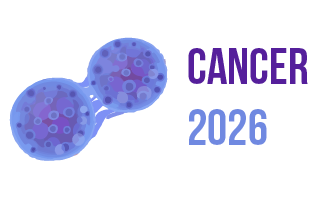4th International Conference on
Innovations and Advances in Cancer Research and Treatment
October 08-09, 2026 | Tokyo, Japan

Cancer 2026

Affiliated Hospital of Nanjing University of Chinese Medicine, China
Abstract:
Background: Colorectal cancer (CRC) patients with microsatellite stability (MSS) typically respond poorly to immune checkpoint inhibitors (ICIs), highlighting the urgent need for novel immune-based predictive biomarkers.
Methods: We integrated single-cell RNA sequencing (scRNA-seq) and spatial transcriptomics (ST) to profile the CRC immune microenvironment, focusing on natural killer T (NKT) and T helper 1 (Th1) cells. T cell subpopulations and pseudotime trajectories were characterized from scRNA-seq data (n=27,414 cells). ST analyses revealed spatial co-localization and interactions, and CellChat was used to infer cell–cell communication. We developed an NKT and Th1-related gene (NTRG) score using TCGA, GEO, and IMvigor210 cohorts, and evaluated its prognostic and therapeutic relevance.
Results: High infiltration of NKT and Th1 cells was associated with better survival and ICI response. These cells co-localized within tumor regions and interacted via the COLLAGEN–CD44 axis. Seven genes (BGN, COL1A1, COL1A2, IGFBP7, KLRC1, LUM, SPARC) were used to construct the NTRG score. A high NTRG score predicted poor overall survival but increased sensitivity to immunotherapy, and was linked to higher mutation burden and distinct immune profiles. Immunohistochemistry validated expression patterns.
Conclusion: This study reveals an NKT–Th1 interaction axis in CRC and proposes the NTRG score as a predictive biomarker for immunotherapy, offering a precision immuno-oncology framework.
Biography:
Attending physician of Chinese Medicine with M.D. and Ph.D. degrees in TCM Internal Medicine. Visiting scholar at Harvard Medical School and Beth Israel Deaconess Medical Center. Focused on integrative Chinese and Western medicine approaches for gastrointestinal tumors. Serves on multiple national and provincial academic committees and editorial boards, including TMR Modern Herbal Medicine and Annals of Translational Medicine. Has led or contributed to research projects funded by the National Natural Science Foundation of China and other major agencies, and has published over 30 peer-reviewed articles in the fields of integrative oncology and traditional medicine.
